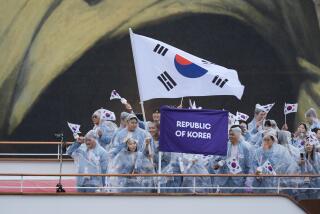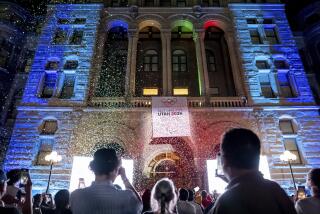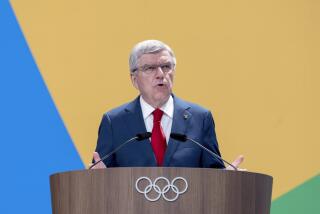2018 Winter Olympics go to South Korea
- Share via
Reporting from Seoul — Many Seoul residents, some with their faces colored the blue and red of the South Korean national flag, thrust their fists in the air and hugged strangers when word came that Pyeongchang, South Korea would host the 2018 Winter Olympics.
In a landslide victory, Pyeongchang beat bids by Munich, Germany and Annecy, France. The South Korean town finished with 63 of a possible 95 votes. Munich garnered 25 and Annecy got seven.
“It gave me goose bumps when I heard that we got it,” said Jeong Shin-don, a white-collar worker in his 40s. “I’m beyond being excited.”
The announcement — made Wednesday by the International Olympic Committee in Durban, South Africa — followed months of intense lobbying by the South Korean contingent, which included a visit to the selection city by the nation’s president, Lee Myung-bak, who delivered a pitch to the voting panel.
In Seoul, hundreds had watched a large video screen outside City Hall, waiting for the announcement. When IOC President Jacques Rogge held up the envelope before announcing the verdict, one celebrant gasped: “Oh please, please, let Pyeongchang get it!”
On Thursday morning, the local Seoul newspapers trumpeted the victory. “Yes, it’s Pyeongchang!” read the banner headline in the Korea Times. Another paper cried “At last! Pyeongchang gets Winter Games.”
For South Koreans, this was a matter of pride and avoiding a fate no one wants in sports or anywhere else: becoming a three-time loser. The choice of Pyeongchang followed two close defeats in attempts for the 2010 and 2014 Games, to Canada’s Vancouver and Russia’s Sochi, respectively.
Pyeongchang is in South Korea’s third-largest county in the scenic Taebaek mountain region, known for winter sports. The selection means the Winter Games will be held in Asia for the first time since the 1998 Games took place in Nagano, Japan.
In Durban on Wednesday, all three cities made 45-minute presentations, followed by 15 minutes of questions before IOC members cast their votes by secret ballots.
South Korea and Germany sent national skating queens to help sway the vote. Katarina Witt, a two-time Olympic figure skating champion, led the Munich bid committee. Kim Yuna, the 2010 figure skating gold medalist, served as an honorary ambassador for the South Korean effort.
At a local beer and chicken eatery, owner Lee Mun-hak had waited for the announcement with a strange patience. His two boys were training to become hockey players. If Pyeongchang got the bid and his children made South Korea’s Olympic team, he had said, they might even be able to play before hometown fans.
“The boys’ whole career depends on the result,” Lee said.
Choi is a news assistant in The Times’ Seoul bureau.
More to Read
Go beyond the scoreboard
Get the latest on L.A.'s teams in the daily Sports Report newsletter.
You may occasionally receive promotional content from the Los Angeles Times.











